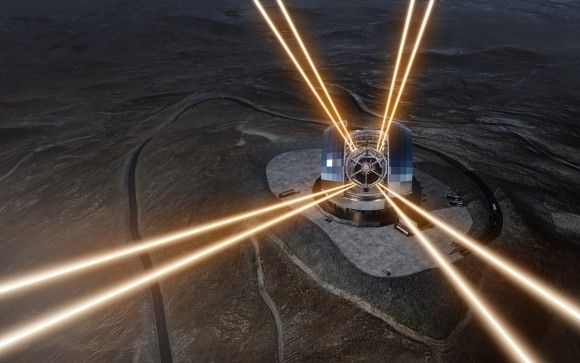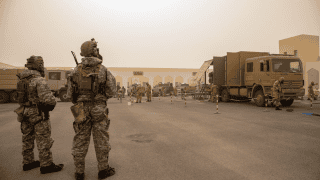- WIADOMOŚCI
- ANALIZA
The U.S. will not increase funding on the antimissile shield in Poland
Recent budget decisions of the U.S. Congress are indicating that the air and missile defense of Poland is a only matter of political game for many U.S. decision makers. At the same time it emerged that the Poles have been negotiating deployment of the U.S. mid-range missile systems as soon as this year.
The final version of the U.S. defense budget for FY2015 should cool down those who would like to build the Polish air and missile defense system only on American installations and missile systems. As it came out, the new Republican plans to speed up the installation of the antimissile shield in Poland by almost two years, have been stopped by the Senate, with large support of president's Obama administration.
Despite the situation in Ukraine and the even more aggressive Russian policy, the project based in Redzikowo near Słupsk may be delayed, and surely it will not be precipitated.
Republican proposals - a thorn in the flesh for Democrats
It all began with the draft of the U.S. defense budget bill for 2015 (National Defense Authorization Act for Fiscal Year 2015), a document preliminarily determining the Pentagon's budget every twelve months, indicating concrete tasks. To be specific, it all began with chapter XVI, Section 1641 of the draft.
And primarily from the initiative of Congressman Howard P. "Buck" McKeon there was put down what follows: "Not later than December 31, 2014, and pursuant to an agreement between the United States and the Government of Poland, the Secretary of Defense” (Missile Defense of Allies and Missile Defense Cooperation) shall deploy to Poland a system providing a short-range air and missile defense capability or terminal missile defense capability (THAAD), or both, and the personnel required to operate and maintain such system".
So - as soon as until the end of this year, batteries of air and missile defense missile systems Patriot or THAAD (Terminal High Altitude Area Defense), would be "temporarily" deployed to Poland. There were also plans to precipitate the launch of the Aegis Ashore installation: "Not later than December 31, 2016, and pursuant to an agreement between the United States and the Government of Poland, the Secretary of Defense shall ensure the operational availability of the Aegis Ashore system site in Poland". Let's remind that earlier plans saw the launch of the "Polish" project in Redzikowo not sooner than by the end of 2018.
What was designed and initially approved in June 2014 has finally not been considered by President Obama. In his analysis of the defense plans in Section "Missile Defense of Allies and Missile Defense Cooperation" it was noted what follows: "The Administration strongly objects to section 1641, which would require deployment of the Aegis Ashore site in Poland no later than 2016 and of short-range air and missile defense capability to Poland no later than December 2014. Accelerating the deployment of the Aegis Ashore site by two years would impose large costs on, and risk to, other Navy programs and likely would not change Russia’s security calculation in Europe. Similarly, deploying short-range air and missile defense capability to Poland would limit the ability of the United States to meet its worldwide operational missile defense requirements. "
As far as it concerns the THAAD antiballistic system, it could be reasonably explained, because even the Americans themselves have only four batteries of the type, and the manufacturer - the Lockheed Martin Company - is "choked" with the U.S. orders (it has to e.g. build another two batteries in the coming two years). But it is completely different with the Patriot batteries.
The U.S. will not additionally enhance Europe's missile defense
The disapproval for accelerating the launch of AEGIS Ashore could be explained, while indeed the missiles that were to installed there (SM-3 IIA) are not yet ready and the work at Redzikowo is under preparation. But the U.S. hard line regarding "short-range" (in the Polish terminology it's about mid-range systems) antimissile system deployment in Poland, shows clear inconsequence both political and business-wise.
Because it was the Americans themselves, who have been declaring before, "...that available short-range air and missile defense systems and terminal missile defense systems of the United States with operational missiles be rotationally deployed to central and eastern European allies, pursuant to agreements between the United States and such allies, to strengthen the air and missile defense capabilities of such allies, as appropriate".
And business-wise, because Americans well know that according to the newest requirements of the Polish defense ministry, the Wisła system provider will be obligated to hand over a number of batteries from the existing stockpiles, even before the final systems are completed (the so called "bridge" capability).
The U.S. armed forces, based on the current destined force posture, will have 15 air defense battalions equipped with Patriot missiles. In April 2014 in the article by Michael S. Tucker and Robert W. Lyons, published in National Defense University Press, it was assessed that 40% of the U.S. Army's Patriot units are deployed either on theatres or stationed in forward bases.
But if it's being told in Congress of a lack of U.S. systems that could be deployed to Poland by the end of 2014, because it would compromise the U.S. operational capabilities, then how can we suddenly talk about delivering those systems later on, in order to meet the Wisła program requirements.
The U.S. Army is not procuring the Patriot systems anymore, so the operational batteries that would have to be sent to Poland in the framework of contract for the Wisła program, would "weaken" the U.S. capabilities indefinitely, and this is precisely what the U.S. administration and Congress have opposed in December this year.
The Wisła program - getting more political?
What is intriguing in all of that is most and for all the fact, that while a procedure for a multi-billion procurement is ongoing - for delivery of anti-aircraft batteries, there are simultaneous talks going on with one of the bidders. It may of course be only about moving some U.S. systems, but once a Patriot battery is deployed in Poland, the chances of other suppliers (Eurosam and MEADS) to deliver a mid-range antiballistic system, would automatically shrink.
Unfortunately, all indicates that the air and missile defense systems in Poland have become a matter of political games, being played here - as well as in the United States. The Republicans could be tossing in the plans for precipitation of the Polish investments on purpose - for the Democrats to reject - clinging to their previous agreements.
The Polish Ministry of National Defense is reassuring that political and military consultations on the subject are going on and the date for opening the Redzikowo base in 2018 is still valid, whereas analysts in the U.S. say the idea may come back when the Republicans take the power in January 2015.
But even if the Republicans return to the idea, it would mean that the U.S. assessment of the political situation in Central Europe depends not on the actual facts on the ground, but on the political constellation in Washington.
















